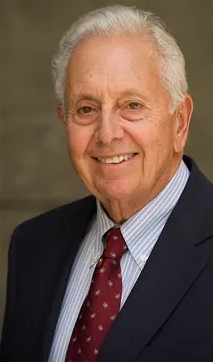In September 2023 I stepped down, after 36 years, as the longest-serving member of the IMA® (Institute of Management Accountants) Financial Reporting Committee (FRC). This committee works with standard setters and regulators, providing its views on the various proposals and projects that organizations such as the Financial Accounting Standards Board (FASB) and the U.S. Securities & Exchange Commission (SEC) are actively working on. It’s been an honor to work with the people serving on this committee and its staff.
Norman Strauss
I joined the FRC amid a successful professional and academic career. After growing up in Brooklyn, N.Y., my 60-year career journey began after I graduated from Baruch College, which had free tuition at the time. Right after college, I started in public accounting at a major New York accounting firm (S.D. Leidesdorf), and, in a lucky break, soon after I made partner there, we merged with one of the then Big Eight firms, which is now EY.
When I first started in public accounting, I was called a junior accountant. Not much to boast about, but after a year or two I became a “semi-senior” accountant, and, then after working hard, I made it to senior accountant.
Years later, when I thought I had grown to become a decent auditor, I had another fortunate break. After I caught something in a client audit, the partners in my firm noticed that I was pretty good at understanding the requirements of accounting standards. Lucky for me, they decided that I had done enough auditing and should be transferred (as soon as possible) into the technical financial reporting department.
One important ingredient for a successful career in accounting is to have good mentors. After becoming better and better at understanding and interpreting accounting standards, I eventually made partner at EY and was named the regional director of accounting and auditing in New York.
Joining the FRC
A few years later, I was transferred to the firm’s national accounting office. There I worked directly for Dennis Beresford (at the time EY’s national director of accounting and a member of the FRC), who I had previously worked with when I was regional director. For many years, Denny was my mentor in becoming an accounting “expert,” and in 1987 he was appointed FASB chair. As a result, he resigned both from EY and the FRC, and I was appointed as his EY replacement on the FRC.
Being a member of the FRC throughout this period was a wonderful experience, and working with the committee on all the technical issues of the day clearly helped me better understand and be able to follow these reporting projects. My work on the FRC helped me immensely in my job at EY (e.g., responding to FASB proposals, overseeing EY’s accounting publications, dealing with practice issues, and keeping up to date on different standards).
It also enhanced my ability to do a good job on the various professional committees I served on for EY over the years. I was chair of the American Institute of Certified Public Accountants’ Accounting Standards Executive Committee. I also had the honor for 10 years of being EY’s representative on the FASB’s Emerging Issues Task Force (along with other FRC members who served on that committee over the years). At this point in my career, I had been promoted to national director of accounting in EY’s national office.
I also was EY’s representative on the FASB’s Financial Accounting Advisory Committee (again, along with other FRC members), and I was on the International Accounting Standards Board’s Advisory Council. Meeting in different countries to discuss accounting theory was fun.
In 2001, I reached EY’s mandatory retirement age and right away began teaching at Baruch’s graduate school as EY’s executive professor-in-residence. I taught a course I created titled Contemporary Accounting Topics, which covered the same things I did at work—current accounting standards and the process that the standard setters go through to finalize new rules and what they mean. I enjoyed teaching about the standard-setting process, and, since many of my students didn’t come from families with much money, they worked hard and knew this was probably their one shot to attaining a successful career. It was the FRC that helped me stay current and that helped me be a better teacher, which I hope helped a lot of students.
Since teaching was like a part-time job compared to public accounting, I had several other jobs after I retired from EY. I did litigation support working as an expert witness and have chaired Baruch College’s annual Financial Reporting Conference, now in its 21st year.
Over six decades, I’ve been fortunate to have the opportunity to consistently take on different challenges, and I continue to believe accounting is a great profession with unlimited opportunities. I thank the FRC and its terrific staff for putting up with me for so long. And I thank IMA for allowing me to contribute to the profession in this way.
For more on Norm Strauss, check out the Count Me In podcast.

February 2024




